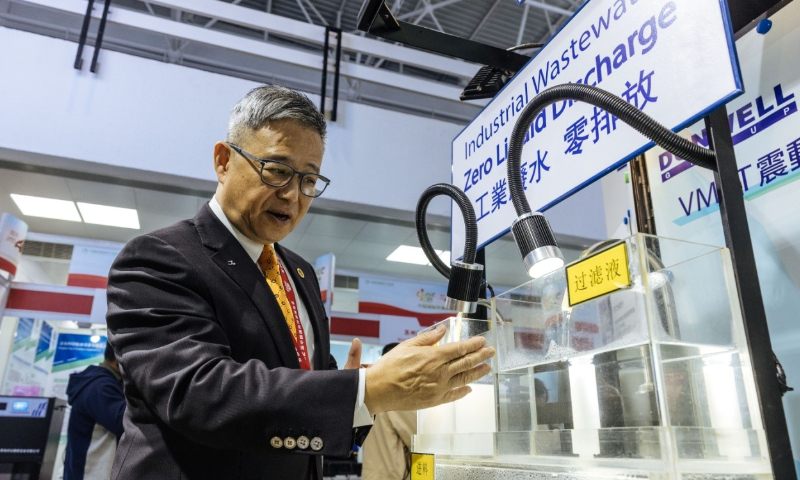
Professor Daniel Cheng Man-chung, president of the Hong Kong Environmental Industry Association, introduces his company's water treatment technology at the China International Environmental Protection Exhibition and Conference in Beijing on April 10, 2024. Photo: Li Hao/GT
The Guangdong-Hong Kong-Macao Greater Bay Area can capitalize on its geographical advantages to enhance connections and cooperation in the environmental industry, sharing resources and strengths, an authority from Hong Kong's environmental industry stated on Wednesday.
"I am looking forward to a closer working relationship in the Greater Bay Area," Professor Daniel Cheng Man-chung, president of the Hong Kong Environmental Industry Association, told the Global Times during the ongoing China International Environmental Protection Exhibition and Conference in Beijing.
Each region can leverage its own advantages, whether in technology or market access, Cheng said, adding that the Hong Kong Special Administrative Region, Macao Special Administrative Region, and South China's Guangdong Province all have their own strengths. For instance, despite its limited land, Hong Kong possesses significant technological expertise and international market experience, which can be instrumental in aiding Guangdong's technology companies to reach global markets. And Guangdong's large market can offer solutions for some of Hong Kong's waste management challenges.
The 22nd China International Environmental Protection Exhibition and Conference, which opened in Beijing on Wednesday, is expected to attract over 1,000 companies from China and overseas, with an anticipated attendance of more than 150,000 people. The event runs from April 10 to 12 in Chaoyang district in central Beijing.
Cheng said there is a diverse range of companies from Hong Kong participating in the exhibition, from those involved in air and water quality testing to those specializing in solar panel technology. His own business focuses on water treatment, oil recycling, and liquid separation.
He expressed a desire for more Hong Kong companies to participate, not solely for profit but for the opportunity to learn and exchange knowledge.
Cheng said that he has been coming to the exhibition every year for the last two decades in order to stay informed about the country's developmental needs and to find niches that his business can address with its technology.
He noted the significant shift in Chinese technology, whose environmental protection level is now on par or even superior to Western versions, and often at a lower cost.
This is partly thanks to the significant role played by the Chinese government in prioritizing environmental issues, Cheng said, noting the shift in focus to sustainable development from the highest levels of leadership.
"The government plays a huge role," he observed, stressing the importance of environmental protection for the quality of life. He praised the proactive steps taken, particularly in major cities like Beijing, Shanghai, and Shenzhen, where there is a stronger adoption of environmentally friendly practices.
Regarding Hong Kong, Cheng pointed out the evolving support from the regional government for the environmental industry. He mentioned how, in the past, the support was more about guiding the direction of private businesses, but in recent years there has been a tangible increase in government involvement and funding.
"When I first came here, I had to spend my own money to attend this exhibition, but today it is funded by the government of Hong Kong," he said.
Hong Kong's environmental industry is smaller in scale compared to that of the mainland, but Cheng said there are about 300 environmental companies in Hong Kong, with 60 to 70 that are particularly active. He noted that many of these companies are engaged in trading rather than manufacturing or technology development.
On the topic of environmental concerns in Hong Kong, Cheng pointed out the growing discourse around waste management.
He explained the challenges of waste disposal in Hong Kong, including the high costs involved and sustainability issues associated with landfill use. The government is moving toward solutions like incineration to reduce landfill use and to generate energy. Cheng stressed the ongoing need for better public engagement and communication to address environmental challenges effectively.
Over the past five years, the Greater Bay Area has shifted from targeted rectification to systematic governance. Under the One Country, Two Systems framework, Guangdong, Hong Kong, and Macao have jointly established an environmental cooperation group. This group collaborates on key ecological issues such as air quality testing, climate change, cross-border river management, hazardous waste disposal, and soil remediation and restoration, ensuring regular exchanges, according to the China News Service.




